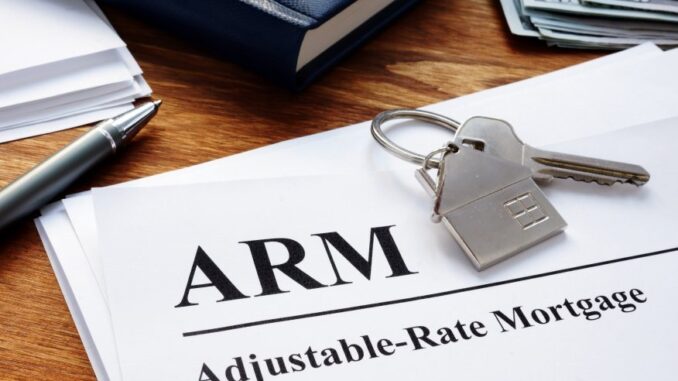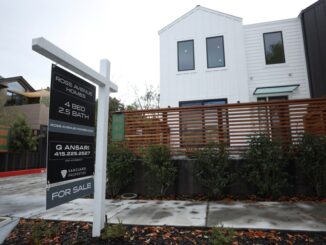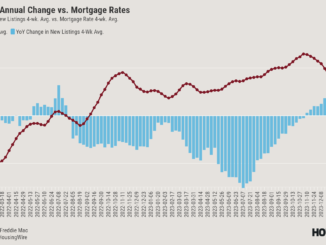
ARM loans might be a saving grace to borrowers who recently purchased a home, but it comes with risks.
- ARM loans have been rising in popularity, according to Redfin, as mortgage rates surge at their fastest pace in decades.
- The typical monthly payment for buyers who took out a 5/1 ARM was an estimated $2,164 during the four weeks ending on May 12.
- That’s roughly 11% ($260) lower than the $2,423 estimated typical payment for buyers who took out a 30-year fixed mortgage.
- For certain types of ARMs, borrowers may face fees or penalties if they refinance or pay off their loan early.
According to a new report by Redfin, the typical homebuyer could save an estimated $15,582 over five years, or roughly $260 per month, by taking out an adjustable-rate mortgage. That’s the largest savings in dollar volume for adjustable-rate mortgage (ARM) holders since at least 2015.
Redfin’s analysis is based on estimated monthly mortgage payments on the median-asking-price home during the four weeks ending May 12 for 30-year-fixed mortgages and 5/1 adjustable-rate mortgages (ARM). A 5/1 ARM is a loan in which the interest rate is fixed for the first five years and then adjusts once a year for the remainder of the loan term, which is typically 30 years. Borrowers can also choose ARMs in which the interest rate resets after seven years, 10 years, or other durations. But Redfin’s analysis focuses on 5/1 ARMs — the most popular type.
ARM loans could be the saving grace homebuyers and owners need. Monthly mortgage payments on recent home purchases are significantly more expensive than for those who purchased their home pre-pandemic. In a 30-year loan term — the most commonly used financing term — homeowners who bought a home in 2021 will pay an additional $101,400 over the next 30 years, Corelogic reports.
The typical monthly payment for buyers who took out a 5/1 ARM was an estimated $2,164 during the four weeks ending on May 12. That’s roughly 11% ($260) lower than the $2,423 estimated typical payment for buyers who took out a 30-year fixed mortgage.
ARM loans have been rising in popularity, according to Redfin, as mortgage rates surge at their fastest pace in decades. The average interest rate on a 5/1 ARM was 3.98% during the week ending May 12, while the average rate on a 30-year fixed mortgage was 5.3% — a spread of 1.32 percentage points. That’s only slightly behind the 1.36 percentage-point spread during the week ending April 12, which is the largest since 2014.
Adjustable-rate mortgages made up 10.8% of all mortgage applications during the week ending May 6. That’s up 3.1% at the start of the year and the highest since 2008, when a lack of regulation of ARMs helped contribute to the housing crash.
Scores of borrowers were drawn to ARMs in the early 2000s due to their lowest initial “teaser rates” and option for a 0% down payment. That became problematic when rates reset higher and many buyers could no longer afford their monthly payments. Today, banks do more due diligence to determine whether buyers will be able to cover the increased costs when the loan resets. For example, Bay Equity Home Loans, Redfin’s mortgage company, requires a down payment of at least 5%, a minimum credit score of 620, and a debt-to-income ratio of no more than 50%. There are also caps on how much lenders can increase interest rates.
ARM loans might be a saving grace to borrowers who recently purchased a home, but it also comes with risks: It’s challenging to predict where mortgage rates will be when the loan resets. If they’re significantly higher, it may be harder for borrowers to cover their monthly mortgage. For certain types of ARMs, borrowers may face fees or penalties if they refinance or pay off their loan early, according to Redfin Deputy Chief Economist Taylor Marr. If borrowers do consider refinancing, they should calculate whether the closing costs for the refinance negate the savings from the ARM, Marr said.
“Adjustable-rate mortgages can work really well for homebuyers who plan to stay in their home for less than 5 to 10 years and have the means to cover higher payments when the loan resets,” said Arnell Brady, a senior loan officer Bay Equity Home Loans.
Brady said that 20% to 30% of his clients are now asking about adjustable-rate mortgages, a significantly larger share than before the pandemic.
Source: Nationalmortgageprofessional.com



